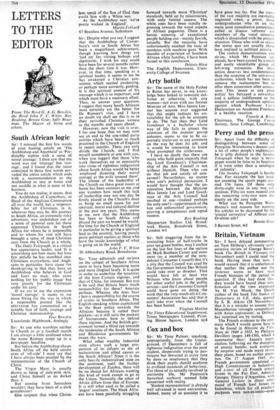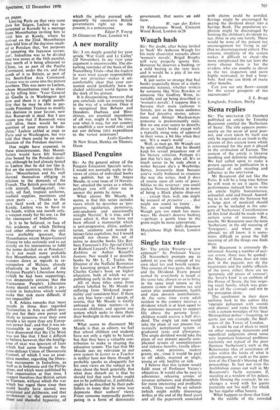Britain, Vietnam
Sir: I have delayed commenting on Tom Driberg's obviously auth- oritative review of George Rosie's book The British in Vietnam (14 November) until I could read the book. - Having done that now, I would remark that it is unfortunate that neither the author nor the reviewer seems to have read French histories of the period in question. If they had done this, they would have found clear con- firmation of the view expressed by H. Van Mook, the Dutch author of the book The Stakes of Democracy in S.E. Asia, quoted by S. R. Atkins (28 November), that it is a mistake to assume that Mountbatten 'strongly sympathised with Asian aspirations', as Driberg has surprised me by stating. The French evidence to the con- trary which I would quote here is to be found in Histoire du Viet- Nam de 1940 a 1952, by Philippe Devillers (pages 149-150), which 1 summarise thus: Japan's capit- ulation, following on the dropping of atomic bombs, took everyone by surprise and made many revise their plans, based on earlier prem- ises. On 17 August 1945, the French government appointed as High Commissioner in Indochina and c-in-c of all French armed forces in the Far East, Admiral Georges Thierry d'Argenlieu, with General Leclerc in direct com- mand of French land forces in Indochina, which for all practical purposes were non-existent—even on paper. Leaving Paris on that very same date for Saigon, Leclerc was in- tercepted at Karachi by a message from Mountbatten inviting him to visit him at Kandy, where he arrived on the 22nd. Mountbatten then told him of the decision reach- ed at Potsdam that, 'for purposes of accepting the Japanese surren- der', Indochina was to be divided into two zones at the 16th parallel, that north of it being allocated to China, i.e. as part of the Pacific Command, under the us, and that south of it to Britain, as part of his South-East Asia Command. France was to come into the picture nowhere. This was news to Leclerc, whom Mountbatten tried to cheer up by telling him: 'Your General de Gaulle is in Washington just now and there is a slight possib- ility that be may be able to per- suade President Truman to modify this decision in your favour, now that Roosevelt is dead. But I can assure you that if Roosevelt were still alive, there would be no question of your return to Indo- china.' Leclerc cabled at once to Paris and to Washington, but was told that there could be no mod- ification of the Potsdam decision.
One might have expected, in these circumstances, that Mount- batten would have felt himself also bound by the Potsdam decis- ion, although he had already hinted to Leclerc that he did not like it. But on the contrary, writes Devil- lers: `Mountbatten and his staff showed themselves obliging in relation to the demands of the French. The British provided them with aircraft, landing-craft, vic- tuals, oil fuel, tropical uniforms, medical supplies, munitions and spare parts . . . Thanks to the very hard work of the staff at Kandy, Leclerc was to have in his hands, within one month only, a weapon ready for his use, i.e. for the reconquest of Indochina.
Is it to be believed, in face of this evidence, of which Driberg and other observers on the spot were probably ignorant, that Mountbatten meant Major-General Gracey to take seriously and to act strictly on his -instructions to fulfil the terms decided on at Potsdam? Is it not much more probable that Mountbatten, caught with his trousers down as regards to re- occupation of Malaya, already effectively in the hands of the Malayan People's Liberation Army (which he had been supporting), was desperately anxious that the Vietnamese People's Liberation Army should not establish a pre- cedent in Indochina which would make that task more difficult, if not impossible?
S. R. Atkins remarks that 'most people in those days regarded Nationalists in Asia as selfish peo- ple out for their own power and likely to tyrannise over their own people a lot more than any Europ- ean power had', and that it was un- reasonable to expect Gracey to have discovered that Ho Chi Minh was not like that. I find it difficult to believe,however,that the Intellig- ence of sec was ignorant of facts which had come through to the since-defunct Union of Democratic Control, of which I was an exec- utive member, regarding the libera- tion movements in Indochina, as well as in Indonesia and the Philip- pines, and which were published by that organisation at that time. I suggest therefore that British action in Vietnam, without which the war which has raged there since then could hardly have started, was calculated and deliberate, and that professions to the contrary are sheer and shameful hypocrisy, of which the policy pursued sub, sequently by successive British governments right up to the present, is a continuance.











































 Previous page
Previous page